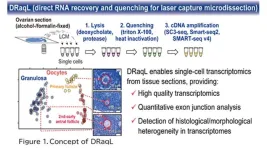(Press-News.org) Recent evidence strongly implicates infection by the Epstein-Barr virus (EBV) as the trigger for development of multiple sclerosis (MS). An international research team is now gathering to unveil the role of EBV in the onset and progression of the MS disease.
The team has ambitious goals:
“We aim to find out why only a few EBV infected people develop MS, and define the underlying mechanism of this process”, explains the principal investigator (PI), Professor Kjell-Morten Myhr of the University of Bergen.
“Our research will also seek to investigate if targeting the EBV infection with antiviral treatments can improve the disease course or even stop disease progression”, says Myhr.
“Development of prevention strategies like vaccination would be the next step”, says the co-principal investigator, Professor Øivind Torkildsen at Haukeland University Hospital.
From theory to action
The researchers, representing leading universities and hospitals in Europe and USA, will perform clinical trials of antiviral therapies targeting the EBV infection in MS, analyze blood and saliva samples, as well as performing registry-based research.
They will build on their extensive experience and previous research within their respective fields, and take advantage of high-quality health registries and existing research cohorts of persons with MS. The group consists of experts in multiple fields, including EBV and human genetics, virology, immunology, neurology, MS, clinical trial design, patient involvement, epidemiology, mathematical modelling, artificial intelligence, and data management. A governance method that takes into account patients, their needs and experiences, will ensure multi-stakeholder engagements and co-responsibility
MS and EBV
Multiple sclerosis (MS) is a chronic inflammatory and degenerative disease of the central nervous system. It constitutes the most common non-traumatic cause of neurological impairment among young and middle-aged people and represents a major healthcare burden.
The research published in Science in 2022 shows that Epstein-Barr virus (EBV) infection greatly increases the risk of developing MS and that it is near impossible to develop MS without first being infected by the virus.
EBV infection, also known for causing mononucleosis, is very common (more than 95 percent) in the population. Almost all people with MS have been infected first by EBV, while only 0,2-0,3 percent of the people who have had EBV infection end up developing MS.
There is currently no available preventive treatment against EBV infection nor MS.
Great potential
The goal is to develop a new treatment of MS, targeting the underlying driver of the disease rather than downstream consequences. Further, if successful, it will identify people at high risk of developing MS after infection with EBV and give the possibility of primary prevention of the disease in high-risk individuals. The project has the potential to provide mechanistic evidence for EBV being a prerequisite for MS development and progression, which could form the basis for developing strategies to eradicate the disease.
"This groundbreaking research initiative holds great potential in advancing treatments options for people living with MS. By exploring the intricate EBV-MS connection, it also offers the opportunity for a better understanding of the disease and the development of preventive measures.
Ultimately this leads to an improvement in the quality of people living with MS and, takes us one step closer to a future free from the burden of MS." says Elisabeth Kasilingam, CEO of the European Multiple Sclerosis Platform.
The project EBV-MS: Targeting Epstein-Barr virus Infection for Treatment and Prevention of Multiple Sclerosis
Funded by Horizon Europe with €7 million during 2024-2028
Principal investigators:
Professor Kjell-Morten Myhr, University of Bergen, Director of Neuro-Sysmed centre for clinical research, Norway
Professor Øivind Torkildsen, Haukeland University Hospital and Neuro-Sysmed centre for clinical research, Norway
Project partners and affiliated entities:
University of Bergen, Norway (coordinator) and Haukeland University Hospital, Norway
Oslo University Hospital, as well as Stavanger, and Akershus University Hospitals and Vestre Viken Health Trust, Norway
Karolinska Institutet, Stockholm, Sweden
Sapienza Università di Roma, IRCCS San Raffaele Roma SRL, and Fondazione Italiana Sclerosi Multipla Fism Onlus, Italy
Harvard University, United States
Universidad Pompeu Fabra, Fundacio Centre de Regulacio Genomica, and Hospital Del Mar Research Institute, Barcelona, Spain
The European Multiple Sclerosis Platform AISBL, Belgium
END
Targeting Epstein-Barr virus to treat and prevent MS
Researchers launch pioneering EU funded research initiative to uncover role of Epstein-Barr virus in multiple sclerosis, building on recent research breakthrough
2023-09-20
ELSE PRESS RELEASES FROM THIS DATE:
Can cognitive-behavioral therapy lessen fibromyalgia pain?
2023-09-20
In a recent randomized clinical trial of patients with fibromyalgia, cognitive-behavioral therapy (CBT)—which uses structured techniques to alter distorted thoughts and negative moods—was superior to a matched education treatment in reducing the interfering effects of pain and other aspects of fibromyalgia on daily living.
Within the group that received CBT in the trial, which is published in Arthritis & Rheumatology, improvements were at least partly attributable to reductions in what’s known as catastrophizing, a state comprised of cognitive and emotional processes such as helplessness, rumination, and magnification of ...
Can creatine supplements help people suffering from post-COVID-19 fatigue?
2023-09-20
The amino acid creatine is essential for muscle and brain health, and people commonly use creatine supplements to improve exercise performance and increase muscle mass. Results from a recent clinical trial published in Food Science & Nutrition indicate that dietary creatine may also benefit individuals experiencing post-COVID-19 fatigue syndrome (also known as long COVID).
In the trial, 12 people with post-COVID-19 fatigue syndrome were randomized to take a placebo or 4 grams of creatine monohydrate per day for ...
How will sea level rise affect the health of freshwater mussels and other salt-sensitive species?
2023-09-20
Investigators recently studied several species of freshwater mussels, which are endangered and are especially sensitive to changes in water quality, to explore the ramifications of sea-level rise in coastal rivers. The research published in Environmental Toxicology and Chemistry determined the concentration of sea salt that would harm the viability of young mussels.
The study focused on the ecosystems along the southeastern US coast, where sea-level measurements have indicated rising waters from 2 to 6mm per year. By detailing the levels in which salt water is toxic to mussels at various life stages, the results can provide guidance for conservation programs ...
Can artificial intelligence predict the risk of dying in the years following a hip fracture?
2023-09-20
A new study published in the Journal of Orthopaedic Research indicates that an artificial intelligence–based model trained on basic blood and lab test data as well as basic demographic data can predict a patient’s risk of death within 1-, 5-, and 10-years of experiencing a hip fracture.
In the analysis of 3,751 hip fracture patient records from two in‐hospital database systems at the Beth Israel Deaconess Medical Center in Boston, the 1‐year mortality rate for all patients was 21% and for those aged 80 years and older was 29%. After assessing 10 different machine learning classification ...
Study reveals the most important considerations for grizzly bear conservation
2023-09-20
Humans negatively impact the health of grizzly bear populations through top-down influences like direct mortality associated with forestry roads (from conflict or illegal killings) and displacement from high quality habitats, and through bottom-up influences like reducing availability of food resources. Research published in Wildlife Monographs reveals the relationship between these forces, informing a strategic conservation program.
Investigators radio-collared and followed numerous grizzly bears over multiple years in southeastern British Columbia. They found an interesting interplay between the most important bottom-up factor, ...
Cognitive behavioral therapy eases how fibromyalgia pain is experienced by the brain
2023-09-20
Patients living with fibromyalgia (FM) – a disease that predominantly affects women and is characterized by chronic pain, fatigue and brain fog – often find limited treatment options and a scarcity of explanations for their symptoms. Research led by Mass General Brigham investigators has found that cognitive behavioral therapy (CBT) can significantly reduce the burden of FM by, in part, reducing pain-catastrophizing, a negative cognitive and emotional response that can intensify pain through feelings of helplessness, rumination and intrusive thoughts. This finding is backed by neuroimaging ...
How bats evolved to avoid cancer
2023-09-20
A new paper in Genome Biology and Evolution, published by Oxford University Press, shows that rapid evolution in bats may account for the animals’ extraordinary ability to both host and survive infections as well as avoid cancer.
Bats are exceptional among mammals for not only their ability to fly but also their long lives, low cancer rates, and robust immune systems. Bats are also thought to have played a role in the emergence of SARS-CoV-2. The ability of bats to tolerate viral infections may stem from unusual features ...
High-quality single-cell transcriptomics from tissue sections reveals histology-associated heterogeneity of mouse follicles
2023-09-20
【Summary】
A research group led by Professor Kazuki Kurimoto and Assistant Professor Hiroki Ikeda from the Department of Embryology at Nara Medical University has developed a highly sensitive method for quantitative single-cell transcriptome analysis, which enables the precise examination of cells extracted from tissue sections using laser capture microdissection (LCM), and named the method DRaqL (Direct RNA recovery and quenching for LCM). Moreover, this method allows quantification of exon-exon junctions of mRNA. In an application of DRaqL to mouse ovarian sections, the research group established a predictive model for oocyte transcriptomes based on their diameter. Remarkably, ...
A hot summer led to more malaria deaths the following year
2023-09-20
As climate change accelerates, it is becoming increasingly important to study the impact of climate change on human health. A new thesis from the University of Gothenburg examines church records and historical weather data in the Nordic countries to show that the risk of dying from malaria was higher if the previous summer was a hot one.
The growing impact of climate change on human health is an acute global threat in the 21st century. The rise in certain types of extreme weather events is not only affecting individuals, but also putting ecosystems that are closely linked to our health under pressure.
“As the climate grows warmer, there is a risk of insect-borne ...
Shading the Great Barrier Reef from the sun might slow bleaching-induced coral decline
2023-09-20
Over the past two decades, coral reefs have declined at unprecedented rates. This is in part because of extreme weather events, which cause wide-spread coral bleaching, a process during which corals lose their color because of stressors, including changes in water temperature, light, or nutrient availability. One of the worst mass bleaching events occurred in 2016 and 2017 on the Great Barrier Reef, causing bleaching on 91% of the system’s reefs.
As frequency and severity of mass bleaching events are expected to increase in the future, researchers are looking for ways to protect corals from excessive radiation and temperatures. As part of the Cooling and Shading ...
LAST 30 PRESS RELEASES:
Husker researchers collaborate to explore fear of spiders
Mayo Clinic researchers discover hidden brain map that may improve epilepsy care
NYCST announces Round 2 Awards for space technology projects
How the Dobbs decision and abortion restrictions changed where medical students apply to residency programs
Microwave frying can help lower oil content for healthier French fries
In MS, wearable sensors may help identify people at risk of worsening disability
Study: Football associated with nearly one in five brain injuries in youth sports
Machine-learning immune-system analysis study may hold clues to personalized medicine
A promising potential therapeutic strategy for Rett syndrome
How time changes impact public sentiment in the U.S.
Analysis of charred food in pot reveals that prehistoric Europeans had surprisingly complex cuisines
As a whole, LGB+ workers in the NHS do not experience pay gaps compared to their heterosexual colleagues
How cocaine rewires the brain to drive relapse
Mosquito monitoring through sound - implications for AI species recognition
UCLA researchers engineer CAR-T cells to target hard-to-treat solid tumors
New study reveals asynchronous land–ocean responses to ancient ocean anoxia
Ctenophore research points to earlier origins of brain-like structures
Tibet ASγ experiment sheds new light on cosmic rays acceleration and propagation in Milky Way
AI-based liquid biopsy may detect liver fibrosis, cirrhosis and chronic disease signals
Hope for Rett syndrome: New research may unlock treatment pathway for rare disorder with no cure
How some skills become second nature
SFU study sheds light on clotting risks for female astronauts
UC Irvine chemists shed light on how age-related cataracts may begin
Machine learning reveals Raman signatures of liquid-like ion conduction in solid electrolytes
Children’s Hospital of Philadelphia researchers emphasize benefits and risks of generative AI at different stages of childhood development
Why conversation is more like a dance than an exchange of words
With Evo 2, AI can model and design the genetic code for all domains of life
Discovery of why only some early tumors survive could help catch and treat cancer at very earliest stages
Study reveals how gut bacteria and diet can reprogram fat to burn more energy
Mayo Clinic researchers link Parkinson's-related protein to faster Alzheimer's progression in women
[Press-News.org] Targeting Epstein-Barr virus to treat and prevent MSResearchers launch pioneering EU funded research initiative to uncover role of Epstein-Barr virus in multiple sclerosis, building on recent research breakthrough




